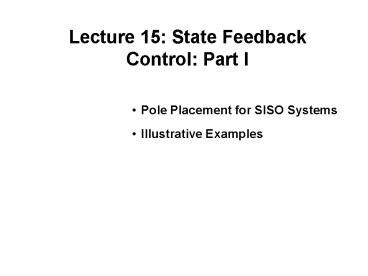Lecture 15: State Feedback Control: Part I - PowerPoint PPT Presentation
1 / 34
Title:
Lecture 15: State Feedback Control: Part I
Description:
Lecture 15: State Feedback Control: Part I Pole Placement for SISO Systems Illustrative Examples Feedback Control Objective Open-Loop vs. Closed-Loop Control Closed ... – PowerPoint PPT presentation
Number of Views:242
Avg rating:3.0/5.0
Title: Lecture 15: State Feedback Control: Part I
1
Lecture 15 State Feedback Control Part I
- Pole Placement for SISO Systems
- Illustrative Examples
2
Feedback Control Objective
In most applications the objective of a control
system is to regulate or track the system output
by adjusting its input subject to physical
limitations. There are two distinct ways by which
this objective can be achieved open-loop and
closed-loop.
3
Open-Loop vs. Closed-Loop Control
Open-Loop Control
Output
Desired Output
Command Input
System
Controller
Closed-Loop Control
Output
Desired Output
Controller
System
-
Sensor
4
Closed-Loop Control
- Advantages
- automatically adjusts input
- less sensitive to system variation and
disturbances - can stabilize unstable systems
- Disadvantages
- Complexity
- Instability
5
State Feedback Control Block Diagram
y
x
u
r
C
H
Z-1
G
-K
6
State-Feedback Control Objectives
- Regulation Force state x to equilibrium state
(usually 0) with a desirable dynamic response. - Tracking Force the output of the system y to
tracks a given desired output yd with a desirable
dynamic response.
7
Closed-loop System
Plant
Control
Closed-loop System
8
Pole Placement Problem
Choose the state feedback gain to place the poles
of the closed-loop system, i.e.,
At specified locations
9
State Feedback Control of a System in CCF
Consider a SISO system in CCF
State Feedback Control
10
Closed-Loop CCF System
Closed loop A matrix
11
Choosing the Gain-CCF
Closed-loop Characteristic Equation
Desired Characteristic Equation
Control Gains
12
Transformation to CCF
To CCF
Transform system
Where x(k)x(k1) (for simplicity)
First, find how new state z1 is related to x
13
Transformed State Equations
Necessary Conditions for p
0
0
0
1
Vector p can be found if the system is
controllable
14
State Transformation Invertibility
State transformation
Matrix T is invertible since
By the Cayley-Hamilton theorem.
15
Toeplitz Matrix
The Cayley-Hamilton theorem can further be used
to show that
Matrix on the right is called Toeplitz matrix
16
State Transformation Formulas
Formula 1
Formula 2
17
State Feedback Control Gain Selection
By Cayley Hamilton
or
18
Bass-Gura Formula
19
Double Integrator-Matlab Solution
T0.5 lam00 G1 T0 1 HT2/2T C1
0 Kacker(G,H,lam) GclG-HK clsysss(Gcl,H,C,
0,T) step(clsys)
20
Flexible System Example
Consider the linear mass-spring system shown
below
x1
x2
Parameters m1m21Kg. K50 N/m
k
u
m2
m1
- Analyze PD controller based on a)x1, b)x2
- Design state feedback controller, place poles at
21
Collocated Control
Transfer Function
PD Control
Root-Locus
22
Non-Collocated Control
Transfer Function
PD Control
Root-Locus
Unstable
23
State Model
Discretized Model x(k1)Gx(k)Hu(k)
24
Open-Loop System Information
Controllability matrix
Characteristic equation
zI-G(z-1)2(z2-1.99z1)z4-3.99z35.98z2-3.99z6
25
State Feedback Controller
Characteristic Equations
zI-G(z-1)2(z2-1.99z1)z4-3.99z35.98z2-3.99z6
26
Matlab Solution
System Matrices m11 m21 k50
T0.01 systss(A,B,C,D) A0 0 1 00 0 0 1-50
50 0 050 -50 0 0 B0 0 1 0 C1 0 0 00
1 0 0 Dzeros(2,1) cplantss(A,B,C,D) Discre
te-Time Plant plantc2d(cplant,T) G,H,C,Dssdat
a(plant)
27
Matlab Solution
Desired Close-Loop Poles pc-20-20-5sqrt(2)(
1j)-5sqrt(2)(1-j) pdexp(Tpc) State
Feedback Controller Kacker(G,H,pd) Closed-Loop
System clsysss(G-HK,H,C,0,T) grid step(clsys,1
)
28
Time Respone
29
Steady-State Gain
Closed-loop system x(k1)Gclx(k)Hr(k),
YCx(k) Y(z)C(zI-Gcl)-1H R(z) If r(k)r.1(k)
then yssC(I-Gcl)-1H
Thus if the desired output is constant ryd/gain,
gain C(I-Gcl)-1H
30
Time Response
31
Integral Control
Control law
1/g
y
x
yd
u
Ki
Z-1
C
H
?
G
plant
Integral controller
-Ks
Automatically generates reference input r!
32
Closed-Loop Integral Control System
Plant
Control
Integral state
Closed-loop system
33
Double Integrator-Matlab Solution
T0.5 lam000 G1 T0 1 HT2/2T
C1 0 GbarG zeros(2,1)C 1 HbarH0 Kac
ker(Gbar,Hbar,lam) GclGbar-HbarK yd1 r0
unknown gain clsysss(Gcl,Hr-yd,C
0K,0,T) step(clsys)
34
Closed-Loop Step Response































